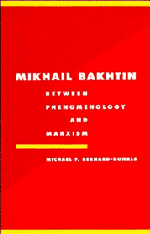Book contents
- Frontmatter
- Contents
- Preface
- Acknowledgments
- Abbreviations
- 1 Problems with Formalism
- 2 Neo-Kantianism and Bakhtin's phenomenology
- 3 Reception and hermeneutics: the search for ideology
- 4 The Marxist texts
- 5 Science and ideology
- 6 Science, praxis, and change
- 7 Bakhtin, the problem of knowledge, and literary studies
- Bibliography
- Index
5 - Science and ideology
Published online by Cambridge University Press: 03 May 2011
- Frontmatter
- Contents
- Preface
- Acknowledgments
- Abbreviations
- 1 Problems with Formalism
- 2 Neo-Kantianism and Bakhtin's phenomenology
- 3 Reception and hermeneutics: the search for ideology
- 4 The Marxist texts
- 5 Science and ideology
- 6 Science, praxis, and change
- 7 Bakhtin, the problem of knowledge, and literary studies
- Bibliography
- Index
Summary
Though, as I tried to suggest in the previous chapter, there are a number of reasons for suggesting that the work of Mikhail Bakhtin is at least in some ways reconcilable to that of certain versions of historical materialism, there are still enough differences between the work of a Bakhtin and, say, an Althusser, to ask just how reconcilable they are. The primary reason for “claiming” Bakhtin for Marxism is the notable Marxist “content” of three works which, at least potentially, bear his name: Marxism and the philosophy of language, The formal method in literary scholarship, and Freudianism: A critical sketch (which will not be under discussion here). But it is not just in these texts that Bakhtin suggests the power of subjects to construct their social reality through the construction of language, thus granting “dialogization” a kind of emancipatory power. In sections of the books on Rabelais, Dostoevsky, and in The dialogic imagination there is also evidence that Bakhtin began shifting his emphasis away from the ways in which individual subjects constructed relations through the construction of language, and toward a theory of how language works to shape ideology and human social reality.
Yet this shift, as I tried to suggest with relation to Marxism and The formal method, is a troublesome one, particularly because Bakhtin in many ways refuses to give up the phenomenological claims that mark his early work. Humans undoubtedly have the power to shape and reshape their social makeup each time they hear, interiorize and then reutter language.
- Type
- Chapter
- Information
- Mikhail BakhtinBetween Phenomenology and Marxism, pp. 104 - 134Publisher: Cambridge University PressPrint publication year: 1995

